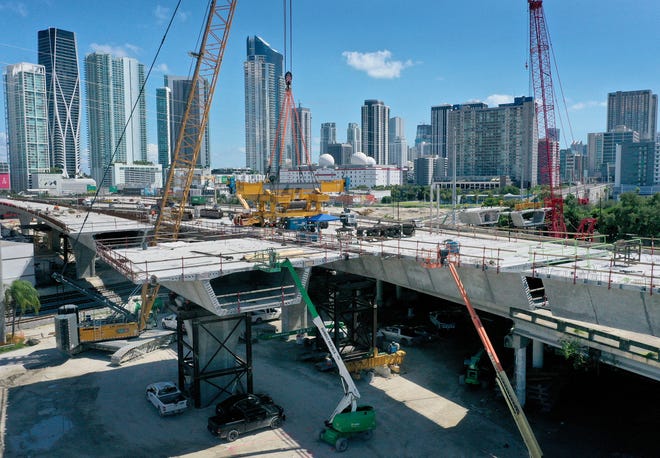
WASHINGTON – The House plans to vote on a $1.2 trillion bipartisan infrastructure bill Thursday – but a day before the vote, lingering Democratic infighting puts the bill in jeopardy.
Members of both political parties have been striving to pass infrastructure legislation for years. They reached a breakthrough this year when Senate Republicans, Democrats and President Joe Biden came together to create a bill that funded roadways, bridges, public transportation and expanded broadband. It passed the Senate 69-30 in August.
Now, passing that bipartisan legislation is within the reach of House lawmakers. So why is a bill with bipartisan support in trouble?
Because progressives and moderates within the House Democratic party are leading competing factions towards a showdown on Thursday. One side wants to delay the vote, while the other has been pushing to proceed.
More:Here's what's in the infrastructure bill as it nears a vote in the House

Progressives
Progressives are arguing that they should not vote on the $1.2 trillion infrastructure deal without passage of a separate budget bill.
Democrats are still hammering out details of that massive bill, which would include "human infrastructure" priorities such as subsidized child care and provisions to fight climate change.
But it has not passed the Senate yet due to Democratic Sens. Joe Manchin of West Virginia and Krysten Sinema of Arizona, who have both maintained the current $3.5 trillion price tag is too high.
As a result, Democrats in the House and Senate have been negotiating changes to the bill to bring all Democrats on board.
Rep. Pramila Jayapal, D-Wash., chair of the Congressional Progressive Caucus, told reporters Tuesday evening there are dozens within her party who would support the infrastructure bill at a later date — after which the Senate and House would pass the budget bill or at least send out agreements of pripoints and other issues.
But they will not vote in favor of the physical infrastructure bill Thursday, despite the problems the larger budget bill currently faces.
Jayapal and other progressives are worried about their leverage with the larger package that includes many progressive domestic priorities. They do not believe House moderates will keep their word in voting for the larger budget bill at a later date if they've already passed the smaller bill.
"I don't know what else to trust. I trusted some things before," Jayapal said Tuesday to reporters. "It would be like if you were a detective and you laid out all the clues on the table, and all the clues pointed to the same person who did it, and then you said, 'I'm not going to look at those clues, I'm just going to trust something else.' We're not going to do that."
Progressives have the numbers to tank the vote with their powerful 96-person caucus. If even a handful or dozen of them vote against the bill, it is unlikely there is enough GOP support to fill their place for passage.
There are a few House Republicans who have openly said they are currently supporting the legislation, like Rep. Adam Kinzinger, R-Ill., who confirmed yesterday to USA TODAY he was in favor of it at the moment.
Despite the 19 Senate Republicans who voted to pass it through the upper chamber — and the money it would bring to their districts — House Republican leaders are currently encouraging their members to oppose it. That’s because Democrats, like Jayapal, have been linking it to the larger legislation.
And Democratic House leadership realistically cannot lose more than three Democrats on a vote.
Moderates
Moderates, on the other hand, have been insisting for weeks that the House should not wait on problems with the budget bill to be ironed out and passed before they vote on the infrastructure bill and send it to Biden's desk.
They are attempting to unlink the two pieces of legislation in hopes of gathering more GOP support.
Rep. Josh Gottheimer, D-N.J., a moderate and co-chair of the Problem Solvers Caucus, told PBS on Monday "you can't hold one up, this infrastructure bill, while you're working on the other one. That just doesn't make sense for the country."
Gottheimer and other House moderates have insisted that they would still vote for a budget bill at a later date.

Will the vote happen?
So far, House Democratic leadership is saying so. But it's unclear whether that will come to fruition.
House Majority Leader Steny Hoyer, D-Md., said he expects a vote on infrastructure Thursday. "I expect an infrastructure vote tomorrow, yes," he said.
House Speaker Nancy Pelosi, D-Calif., has been pulled in both directions as the progressives and moderates have negotiated for weeks to get their way.
Until Monday, Pelosi sided with progressives, saying the House would not host a vote on the smaller infrastructure package until reconciliation was ironed out.
Monday, the Speaker reversed course, telling her caucus in a closed-door meeting the House could no longer delay a vote on the infrastructure bill as negotiations continue on the bigger bill.
But ironing out all those differences in the next day ahead of the vote is a huge task.
The White House and Democratic leadership have struggled in particular with getting answers from Sinema and what she would like to see in a budget package. She has met daily with members of the Biden administration and the president himself.
Arizona Republic:Two issues shaping Sen. Kyrsten Sinema's approach to budget reconciliation negotiations
If the president can bring Sinema and Manchin onboard with perhaps a smaller budget deal, it could pass the 50-50 Senate with a simple majority — thanks to a special process called reconciliation that allows for spending bills to be expedited by sidestepping typical congressional hold-ups and the filibuster.

More:What is 'reconciliation,' and why is it holding up the infrastructure package?
But without their support, passage of a budget bill in the Senate, and better consensus from House Democrats, Thursday's vote on infrastructure is incredibly rocky.
"I'm never bringing a bill to the floor that doesn't have the votes," Pelosi said Sunday on ABC's "This Week With George Stephanopoulos."
Contributing: Ledge King, USA TODAY; The Associated Press
Source link






